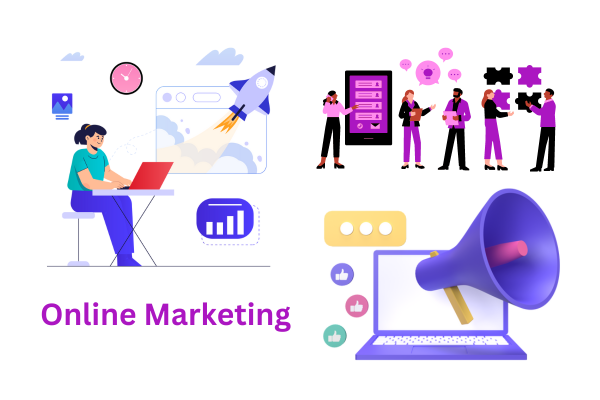Table of Contents
What do you understand by the word ‘Online’?
The word “online” has a few key aspects and meanings:
Etymology and Definition:
Origin:
The term “online” originated from the word “line” combined with the prefix “on,” meaning connected to or via a network.
Definition:
- When something is “online,” it is connected to, served by, or available through a system, especially the internet.
- It can also mean being in a state of connectivity to a network or the internet.
Usage in Context:
General:
“Online” is used to describe activities, services, and statuses involving the internet or a computer network. For example, online shopping, online banking, or being online (connected to the internet).
Adjective:
Describes a state or quality (e.g., online resources, online education).
Adverb:
Describes an action taking place over the internet (e.g., He is working online).
Examples in Sentences:
Adjective:
“She prefers online classes because they offer more flexibility.”
Adverb:
“He spends a lot of time online researching for his projects.”
Cultural and Technological Impact:
- The concept of being “online” has revolutionized communication, commerce, education, and entertainment.
- The term is integral to understanding the digital age, highlighting the shift from offline (disconnected) to online (connected) activities.
Historical Context and Evolution of the word ‘online’
Early Use:
The term “online” began gaining prominence in the 1970s and 1980s with the advent of computer networks. Initially, it referred to devices or systems that were connected to a central computer or network.
Internet Era
With the rise of the internet in the 1990s, “online” evolved to describe activities and services that utilize the World Wide Web. This includes browsing websites, sending emails, and participating in online forums.
This laptop will help you do this easily during this festive season :-
Apple MacBook Air Laptop: Apple M1 chip, 13.3-inch/33.74 cm Retina Display, 8GB RAM, 256GB SSD Storage, Backlit Keyboard, FaceTime HD Camera, Touch ID. Works with iPhone/iPad; Space Grey. Click on the link below to buy this laptop :- https://amzn.to/4egZEOu
Technological Impact
Connectivity:
Being online means being connected to a larger network, often the internet. This connectivity enables access to vast amounts of information, communication with others across the globe, and the use of various digital services.
Data Exchange:
Online activities involve the exchange of data. This can be as simple as loading a webpage or as complex as streaming video content or engaging in real-time multiplayer gaming.
Social and Cultural Impact
Communication:
Online platforms such as social media, email, and instant messaging have transformed how people communicate. These platforms enable instant, global communication, breaking down geographical barriers.
Commerce:
Online shopping has revolutionized the retail industry. E-commerce platforms like Amazon and eBay allow consumers to purchase goods from anywhere in the world, often at competitive prices.
Education:
Online education has become a significant trend, especially with the advent of MOOCs (Massive Open Online Courses) and platforms like Coursera and Udemy. These provide access to educational resources and courses to anyone with an internet connection.
Entertainment:
Streaming services like Netflix, Spotify, and YouTube have changed how people consume media. These services provide on-demand access to a vast array of content, personalized to user preferences.
Online services
Online services encompass a wide range of digital activities and resources that are accessible over the internet. These services can be divided into several categories based on their functions and purposes:
1. Communication Services
Access to a Wide Audience:
Online marketing allows businesses to reach a global audience without the geographical limitations associated with traditional marketing.
24/7 Availability:
Unlike physical stores, online marketing campaigns can run around the clock, providing constant exposure and engagement opportunities.
2. Cost-Effective
Lower Costs:
Digital marketing often requires lower initial investment compared to traditional marketing channels like TV or print ads.
Flexible Budgeting:
Businesses can start with a small budget and scale their campaigns as needed, allowing for more precise control over spending.
3. Targeted Marketing
Precise Targeting:
Online marketing tools enable businesses to target specific demographics, interests, and behaviors, ensuring that ads reach the most relevant audiences.
Personalization:
Tailoring content and ads to individual users based on their preferences and past interactions enhances user engagement and conversion rates.
4. Measurable Results
Analytics and Reporting:
Digital marketing provides detailed metrics and analytics, allowing businesses to measure the effectiveness of their campaigns in real-time.
Data-Driven Decisions:
Insights gained from analytics help in optimizing campaigns, improving ROI, and making informed marketing decisions.
5. Enhanced Engagement
Interactive Content:
Online marketing allows for the creation of interactive content such as videos, polls, and quizzes, which can increase user engagement.
Two-Way Communication:
Social media and other online platforms enable direct interaction with customers, fostering stronger relationships and providing immediate feedback.
6. Increased Conversion Rates
Optimized User Experience:
Well-designed online marketing campaigns can lead users through a seamless journey from awareness to conversion.
A/B Testing:
Online marketing tools allow for A/B testing of different strategies, enabling businesses to identify and implement the most effective approaches.
7. Brand Development
Content Marketing:
Consistently publishing high-quality, relevant content helps establish authority and build brand loyalty.
Social Proof:
Positive reviews, testimonials, and user-generated content on social media can enhance brand credibility and attract new customers.
8. Scalability and Flexibility
Scalable Campaigns:
Digital marketing campaigns can be easily scaled up or down based on performance and business needs.
Adaptability:
Online marketing strategies can be quickly adjusted in response to market changes, trends, or new opportunities.
9. Competitor Analysis
Monitoring Competitors:
Online marketing tools allow businesses to track and analyze competitors’ strategies, helping them stay competitive and identify market gaps.
10. Accessibility and Convenience
Mobile Marketing:
With the widespread use of smartphones, businesses can reach customers on the go, ensuring constant connectivity and engagement.
Automated Marketing:
Automation tools streamline repetitive tasks, freeing up time for businesses to focus on strategy and creativity.
Conclusion
Online marketing offers a dynamic and versatile approach to reaching and engaging customers. Its ability to provide measurable results, targeted advertising, and cost-effective solutions makes it an essential component of modern business strategies.


